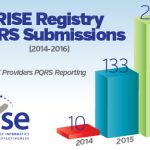The Rheumatology Informatics System for Effectiveness (RISE) registry is a constantly evolving resource, and many valuable offerings are being made available at the 2018 ACR/ARHP Annual Meeting in Chicago. Here’s a list of things you won’t want to miss: RISE Booth in the Discovery Center Join RISE at the ACR Discovery Center inside the exhibit…
RISE Continues to Improve Offerings for Providers
ACR members are realizing what they have at their fingertips—a registry fully staffed with knowledgeable people ready to help them succeed under MIPS. This valuable resource allows members to do what they do best: Treat patients with rheumatoid arthritis (RA), which is one of the primary goals of the Rheumatology Informatics System for Effectiveness (RISE)…

Avoid Errors: Insights into Ensuring Accurate Data in EHRs
With the increasing use of electronic health records and quality measure reporting requirements, data collection has become crucial for rheumatologists. But how do clinicians prevent human error and ensure data accuracy?
ACR in Action: A Look at ACR Activities That Support Your Practice
Rheumatologists working in every practice setting face a number of challenges that can seem insurmountable. How do you cost-effectively manage administrative burdens? How do you establish an efficient and effective approach to capturing quality metrics? How do you maintain the critical elements of the care you provide, such as diagnostic musculoskeletal ultrasound and patient access…

RISE Registry Report
The Rheumatology Informatics System for Effectiveness (RISE) Registry is the ACR’s registry for quality improvement and reporting. Aggregated statistics and trends seen in the RISE Registry will be published monthly in The Rheumatologist. Visit www.RISEregistry.org to learn how you can use RISE to improve your patient care. As a Qualified Clinical Data Registry, RISE provides an…
Maximizing the ACR’s Power: A conversation with Rheumatology Research Foundation President Eric Matteson, MD, MPH
In preparing for the second year of his term leading the Rheumatology Research Foundation, Eric Matteson, MD, MPH, has developed an ambitious set of goals for the year ahead, and he says the strong professional and personal inspiration he gets from serving in various volunteer roles within the College is what helps drive him to…
The ACR Advocates for More MIPS Points for RISE Use
On behalf of the rheumatology community, the ACR recently submitted an entry for a rheumatology-specific Clinical Practice Improvement Activity (CPIA) that, if accepted, will be included in the 2018 performance year. The CMS put a call out to the public for CPIAs in an attempt to make MACRA more meaningful for participating providers. The ACR…

Tips for Rheumatologists to Master Quality Measurement in Clinical Practice
WASHINGTON, D.C.—In 2017, rheumatologists will begin to track and report quality data for reimbursement under the the Medicare and CHIP Reauthorization Act of 2015 (MACRA). Panelists shared their tips on how to score more points under MACRA and utilize existing technology at a Nov. 14 session called Implementing Quality Measurement in Your Clinical Practice at…
RISE Up: The Registry Now Includes More than 4 Million Patient Encounters & Counting
ATLANTA—Despite a downpour outside, ACR and ARHP leaders enjoyed sunny news about the Rheumatology Informatics System for Effectiveness (RISE) Registry at the on Jan. 21. RISE now includes data on more than 4 million patient encounters, and attendees were charged with thinking of ways to increase utilization of the registry and better use its valuable information….
Top ACR Priorities in 2017 Include Drug Costs, MACRA
With a new federal administration and Republican-controlled Congress taking the helm in 2017, the ACR Government Affairs Committee has identified top legislative and regulatory priorities for the year. “The main priority is going to be helping represent the rheumatology community as Medicare is reformed, because the era of MACRA started Jan. 1,” says Angus Worthing,…